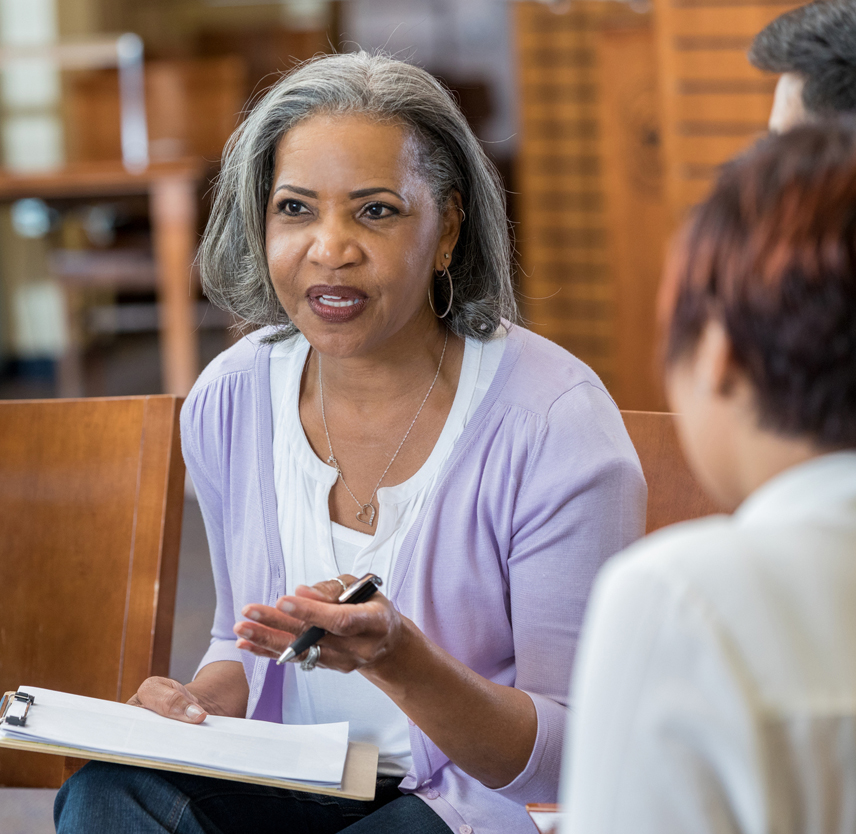
How can educating families about common impacts of brain injuries help them heal?
One of the first things that we do is to show families and survivors a list of common results of brain injury. Most people are familiar with the cognitive changes, like trouble with memory or adding numbers.
But the list that we provide people has things on it like communication challenges, social challenges, new fears about being around other people. That’s a common impact of brain injury. We talk about emotional changes; people are more likely to be depressed in the first year of recovery. People often feel what we would call emotional ability; they’re happy, then they’re sad, and emotions are all over the place.
All these things are very directly related to injury. Most people are not aware of the scope of the changes that occur after brain injury, even when they’ve had a brain injury or when their spouse has had a brain injury; they tend to associate some of those changes with their difficulty with managing the situation. There’s a component of that that’s true; if we’re stressed, we’re not going to be as smooth emotionally as we are when we’re not stressed. But a lot of this really does come straight from the injury.
So in counseling when I present people with this list and talk about how those specific instances or changes are impacting their family or their relationship, people are often very emotional. They say things like, "Did you come in my house? How did you know exactly what our life is like?" And to have the experience of knowing that while the changes they’re going through are very difficult, they’re not unusual or unexpected can be very, very comforting for people.
Related Resources
About the author: Emilie Godwin, PhD
Emilie Godwin, PhD, LPC, MFT is a faculty member and licensed clinician at Virginia Commonwealth University, with a specialty focus on couples and family counseling after brain injury. Currently, she serves as the Family Support Program Coordinator for the VCU TBI Model System projects.


Comments (8)
Please remember, we are not able to give medical or legal advice. If you have medical concerns, please consult your doctor. All posted comments are the views and opinions of the poster only.
Anonymous replied on Permalink
How do o get a copy of the list you show families? I feel like that would be so helpful to have to show mine.
Anonymous replied on Permalink
I think you might have to ask your doctor for one?
This page has a couple of basics based on where you were injured: https://www.brainline.org/tbi-basics/interactive-brain
Thamodi replied on Permalink
I have a brain injury
Laura Fonda replied on Permalink
As the days go by I feel as though I’m drowning a little more. I’m so angry and resentful. I’ve kept it bottled up a year and tried my best to stay strong for my children and my husband but I’m breaking and I’m ready to burst. My husband (42 years old at the time) suffered a TBI 13 months ago. Overnight I went from being his wife to his caregiver. On top of it a mother to our children 4 and 6 years of age. I’m so physically and mentally exhausted. I’m starting to lose myself. I’ve kept it all so bottled up but I’m hurting so much. I’m lonely and I feel so disconnected from myself and everyone in my life and I wish I could find a way to fix it and continue to remain strong for my husband and children. On top of my husband recovering from a TBI this past year he also was diagnosed with cancer, underwent surgery and treatment- we really got hit with a whamie. The past two weeks I haven’t been able to keep it in anymore and I’m spending my days having crying spells. I’m taking on too much and I’m overwhelmed but at the same time don’t really have a choice about it. I just feel stuck. I’m grieving for who my husband was before but still encourage and love him for who he is now. But it’s so hard to not miss him. I’ve tried a few different therapists but they weren’t very helpful since they weren’t familiar with caregiving for a spouse recovering from a TBI. Not sure where this post is going or who is going to read it but I’m just so...lost and lonely.
Brenda Saunders replied on Permalink
Laura Fonda, It’s been awhile since you posted, but I want to ask how things are going this far out from your husband’s injury. I feel for you & totally identify with all that you said.
Jason replied on Permalink
Laura. I’m reading. And I care. My nephew, more like a son, was in a motorcycle accident a month ago, and our family now faces a very difficult road ahead. One that you know much better than I. Sending love, and assurance that someone cares.
Marie, Ontario replied on Permalink
Laura. If I could reach through the phone I would wrap you in a hug. You need to take some You time. I am 3+ years out dealing with my husband. Like you I kept emotions bottled up but that is bad for your health. My children are adults so I don't have that on my plate. I forgot to take time for me until I took a program for caregivers. That reminded me that if I am not in a good place then I can't help him. Please reach out to friends/ family. Have the kids go for a sleep over and take a night for you. I went back to reading a book. Guilt will always be part of the mom makeup but you have to kick it to the curb. Please do something nice for yourself. I promise you its hard but you need to do it. Look for a support group for brain injury survivors. It may be helpful to your husband to talk with other people in the same situation. Often caregivers are involved too so you would find support as well. The hardest part is the isolation you feel. Sadly you are not alone. One hour/day at a time is sometimes the only way to cope. Remember to breathe slowly and deep. Hugs.
Mery Martin replied on Permalink
This page has so amazing Information. Thanks for that link. https://www.brainline.org/tbi-basics/interactive-brain/ https://mcdvoice.me/